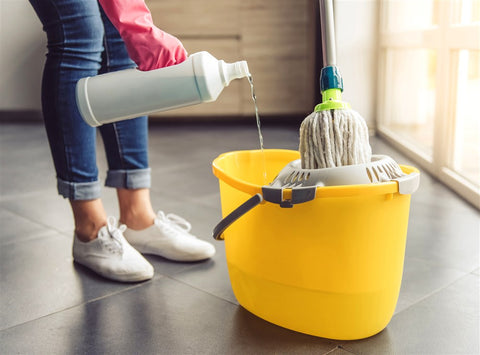Cleanliness can be somewhat subjective: some folks wear things once and feel compelled to wash them, while others wear them five times before exposing them to some kind of soap. But when it comes to cleaning your home, there are some standards to consider, if only for your health’s sake.
If you saw what lived on your surfaces under a microscope, your skin might crawl: Teeny tiny bacteria and microbes consisting of viruses, soil, fungi, bacteria, animal dander, pollen, sweat, excretions and skin cells all invade your spaces on a regular basis. According to research in Popular Science, the life span of a germ varies greatly depending on the bacteria and the surface. E. coli (intestinal bacteria that can make you sick) can live for a few hours to a full day, while the calicivirus (a.k.a. the stomach flu) can live for days or weeks. So how often should you clean your tub, or wipe down your toilet or change your sheets, before they become something of a biohazard? Probably more often than you think.
TRY THIS SCIENCE-BACKED CLEANING SCHEDULE
We asked two experts, Jason Tetro, microbiologist, visiting scientist at the University of Guelph and author of The Germ Code and The Germ Files, and Becky Rapinchuk, a cleaning expert, and author of the books Simply Clean and The Organically Clean Home, for their advice.
HOW OFTEN SHOULD YOU…
CHANGE THE SHEETS?
Once a week — two at the most. Though most bacteria on sheets is environmental (like dust) and mostly harmless, the bacteria and fungi, along with the dirt and oils sloughed off during sleep, can cling to sheets and your skin, contributing to acne and dandruff. To keep your bed clean, change your sheets once a week (as Rapinchuk recommends), or a minimum of every two weeks (as Tetro recommends), and wash them in hot water.
DISINFECT THE SINKS?
Every day. Even if they look clean, sinks can get really gross — Tetro says the bathroom sink accumulates fecal matter (from washing your hands after you use the bathroom). Also, bacteria from food, like E.Coli and Salmonella, can contaminate the kitchen sink, especially if you’ve been handling raw meat. When water splashes back up onto your hands, they’re contaminated, too. To stay on the safe side, wipe down your sinks daily.
VACUUM RUGS AND WASH FLOORS?
One to two weeks. Rugs should be vacuumed weekly (more often if you have pets) to keep dust, dirt and allergens at bay. Give floors a good wash or steam once every couple of weeks, says Tetro. You might want to wash your kitchen floors a little more often, due to food bacteria that can spread around
WIPE DOWN THE BATHROOM?
Once a week at least. Tetro says your bathroom is the ultimate bacteria host; E.coli can be found within six feet of the toilet and in the sink. To keep it at bay, disinfect the toilet and sink at least once weekly, and the bathtub every two weeks — more if you shower often. Your shower curtains should be disinfected weekly to avoid mildew, which can cause skin, eye and throat irritation in some people.
SWAP OUT TOWELS?
It depends on the room. Bath towels become loaded with bacteria (including staph and fecal) and if your towel doesn’t fully dry, that bacteria can grow. Plus, dandruff-causing fungi can also grow in them, Rapinchuk recommends swapping out bath towels every other day. Your kitchen towels collect bacteria every time you handle food and wash your hands. Tetro recommends washing those weekly, unless you handled raw meat. In that case, wash the towel immediately.
SWAP OUT SPONGES?
Every few days. Your kitchen sponge gets awfully germy, with billions of bacteria on every square inch, says Tetro. But don’t get freaked out — most of the bacteria isn’t harmful. Because washing sponges with soap and water doesn’t really work, Tetro recommends dropping them into boiling water for 2 minutes, putting them in the microwave for 2 minutes while damp every couple of days, and replacing them when they deteriorate.
WIPE DOWN DOORKNOBS?
Once a week (in some rooms). Though doorknobs accumulate a lot of bacteria, they need only need to be washed infrequently, says Rapinchuk. However, doorknobs in the bathroom and the kitchen are bound to catch a lot more bacteria, so disinfecting them at least once a week might be a good idea, especially if there’s an illness in the house.
Does all this cleaning seem daunting? If you can’t seem to keep up, do your best.
Source – NBC News



